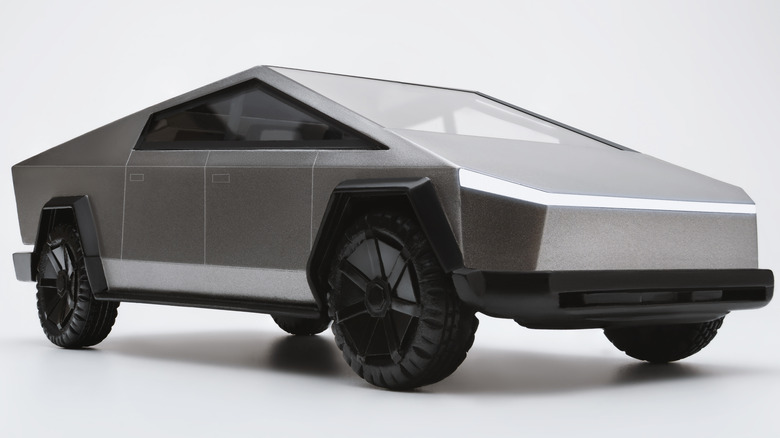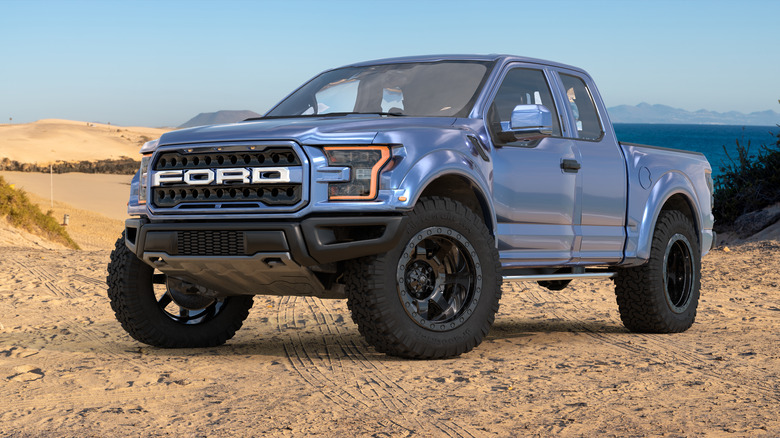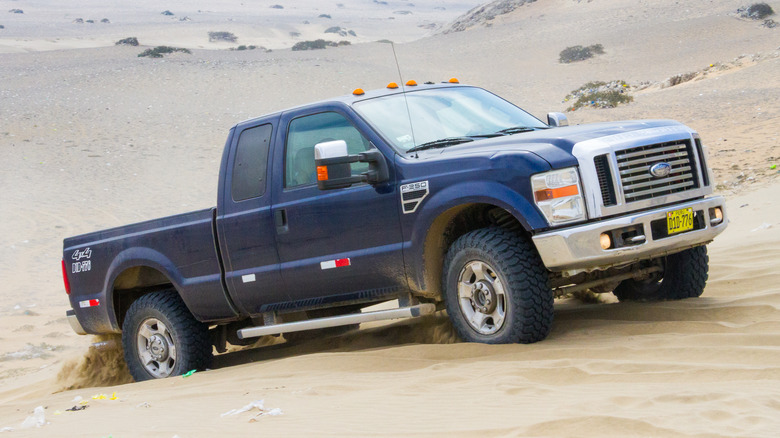The Real Reason The Tesla Cybertruck Beat A Ford F-150 In A Tug-Of-War
"Electric vehicle" is a term that now covers a wide range of wattage-powered automobiles. You're no longer stuck with small, low-range eco-wagons like the Nissan Leaf — you can get luxury electric cars, electric sports cars, electric muscle cars, and even battery-powered trucks. Arguably the biggest electric truck news in recent years is the yet-to-be-released Tesla Cybertruck's crushing tug of war victory against America's best-selling pickup, the Ford F-150. Although it looked like an easy victory for Tesla's polygonal pickup, there was some controversy following the video's release. This included a tweet from Ford's vice president Sunny Madra, who asked Tesla to send his company a truck so they could repeat the test themselves. Musk's response was simply "bring it on," and no further news has emerged since that point.
Bring it on https://t.co/pCnln1NdRO
— Elon Musk (@elonmusk) November 25, 2019
Since the test, Ford has also launched its own electric truck: the F-150 Lightning. While the Cybertruck has been facing continuous delays, the F-150 Lightning has been available for a while now and there is a chance you'll encounter one on the street. However, Ford has been faced with the same supply shortages as many other manufacturers and its electric truck output has suffered as a result. Tesla's Cybertruck has faced delay after delay. Despite plans being in place to put the truck into mass production later this year, it has again been knocked back and the price went up, too. Musk initially planned to have the entry-level Cybertruck on the market for under $40,000, but has since hinted that the entry-level model, along with the vehicle's two other trims, might be significantly more expensive than that.
What happened when the trucks went head to head
In 2019, Elon Musk published a tweet accompanied by a 15-second video showing the Tesla Cybertruck easily overpowering a Ford F-150. The contest played out a bit like an arm wrestle; the Ford started to pull but met with too much resistance and the Cybertruck simply didn't budge. Then the Tesla truck started to slowly apply power and smoothly pull the struggling F-150 uphill.
Cybertruck pulls F-150 uphill pic.twitter.com/OfaqUkrDI3
— Elon Musk (@elonmusk) November 24, 2019
Despite the subsequent controversy, we have yet to see a full-scale repeat of the experiment. Ford had requested to borrow a Cybertruck so it could run the test on its own turf, but the silence on the Michigan-based manufacturer's part — and the fact there has been no further word from Tesla — could mean that truck never arrived or the automaker recorded the same results and decided to just keep quiet and move on. But why was there any controversy surrounding the incident? And why does anyone think the experiment is worth repeating? It all comes down to what some see as a major oversight on Tesla's part that meant the F-150 couldn't actually make use of the power its engine provided.
People feel the first test wasn't fair
On the face of it, the 15-second video was enough to tell the whole story. Two trucks were tied together, and the Tesla had the dubious disadvantage of going slightly uphill during the contest, so it will have had to bear a bit more of the Ford model's substantial weight. It would be easy to watch the brief video, see the crushing victory, and move on. But several people, including celebrity physicist Neil deGrasse Tyson, spotted an alleged flaw in Tesla's test. "Electric vehicles are famously heavy – over both axles. It's all about the weight borne by spinning tires. That's the source of traction, not the engine power," Tyson tweeted.
Electric vehicles are famously heavy – over both axles. It’s all about the weight borne by spinning tires. That’s the source of traction, not the engine power.
— Neil deGrasse Tyson (@neiltyson) November 25, 2019
Musk quickly hit back against the physicist, claiming the result would be the same even if both trucks were loaded to the brim. The Tesla owner tweeted: "Electric motors also have insane torque. If we load both trucks to the max, electric still wins. Physics is the law, everything else is a recommendation." However, Tyson countered, claiming weight does in fact make a huge difference in this kind of situation. Tyson's tweet read: "We all love Torque. But high Torque just spins a tire in place if there's not enough weight to provide traction. Fully load the F150, giving highest traction to its rear wheels, then try to drag that up the hill. I otherwise agree: Load both to the max and the highest torque wins."
Weight does make a difference, as a smaller Cybertruck shows
This isn't the only time an F-150 has lost a tug of war to something resembling a Tesla Cybertruck. YouTube channel Hacksmith built a half-scale replica of Tesla's powerful EV. The team's model went through a number of tests before finally facing off against an F-150. Although the replica featured a tri-motor power train just like the real Cybertruck, it is worth pointing out that the vehicle wasn't built by Tesla itself and was an independent project. Despite the fact Tesla wasn't really involved, the mini Cybertruck did not let the brand down.
During the actual test, the half-scale Cybertruck took on a 2010 Ford F-150 XLT. The Ford was fitted with a 5.4-liter V8 capable of producing 310 horsepower and 365 ft-lbs of torque. During the first test, the Ford easily pulled the half-ton mini Cybertruck. The truck's builders said this was always going to happen due to the vehicle's weight, and proceeded to load up the mini truck before running the test again. After packing on an extra 1,500 pounds of bulk, bringing the total weight to around 2,500 pounds, the mini Cybertruck performed a lot differently. The Ford was unable to pull it, and once the electric vehicle started applying some torque, the F-150 began rolling backward, losing the battle.


